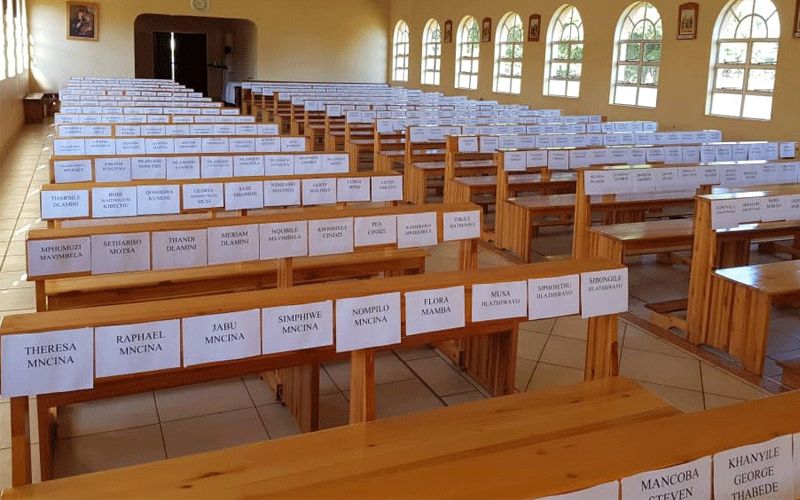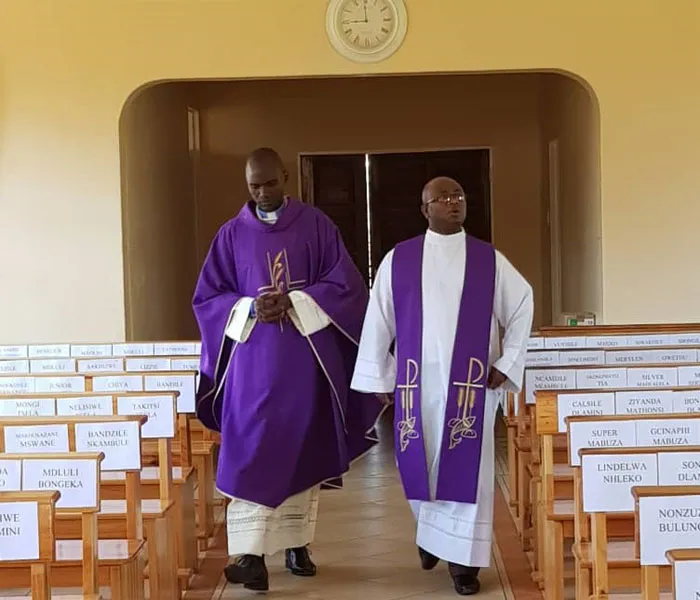She says that the only thing that families miss now is the Holy Communion.
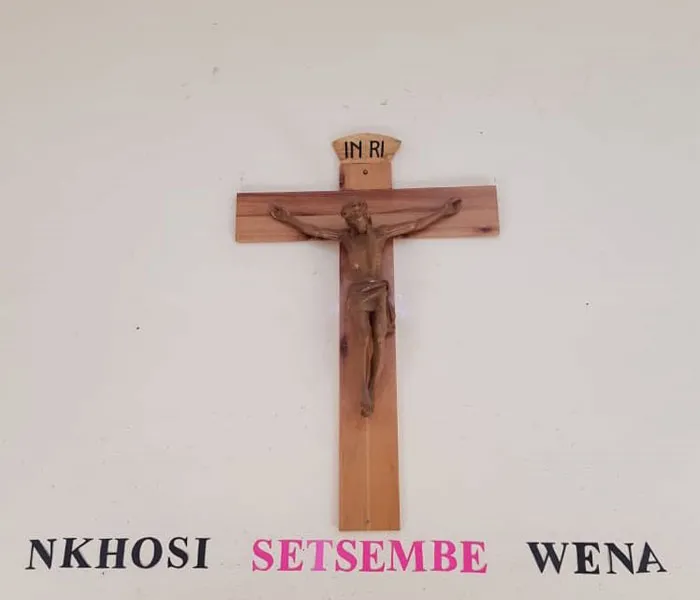
“Even then, our priest and the Bishop always design for us spiritual materials including spiritual communion materials and they always remind us not to be sad that we are not receiving the Holy Communion. They tell us that Christ dwells in us eternally when we read the Bible, when we pray and when we perform the act of Spiritual Communion,” says Mrs. Musi.
In a reflection, “Journeying with Our People During this Hard Time of Covid-19” that was shared with ACI Africa, Fr. Francis noted that the outbreak of COVID-19 had changed the way of worship in the African setup.
“For many of us, church has been like our second home, a place where we visit for solace when times are hard, a place where we feel free and comfortable to spend time and interact with fellow Christians and sometimes even after service we enjoy to hang around bonding with each other as we nurture our family spirit,” says Fr. Francis.
(Story continues below)
According to the Kenyan-born Priest, Sunday for many years has been a day of obligation, “a day set apart for the worship of God and we naturally wake up geared for church.”
“Then Corona virus came along and our church services were suspended. The government placed restrictions on gatherings and travels and God’s people were left unsure of what to do, breaking a long held tradition… Waking up on a Sunday morning without a clue of what to do or where to go or how to spend the day was the most boring thing to happen on a Sunday,” he says.
To keep the faithful engaged even as they stay away from Public Mass, Fr. Francis, together with his confrere at Sts. Peter and Paul Parish, has pinned names of the parishioners on the parish benches in a way he says will make them feel not forgotten even as they miss Public Mass.
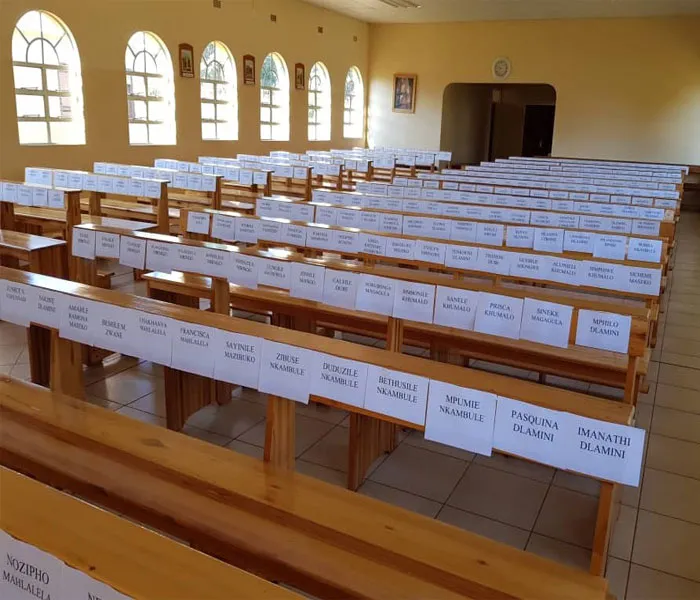
“We requested all our parishioners to send us their names. We asked for the names of every soul in our parish from the youngest infant to the senior most citizen of the community. Within four days, almost all the names had been submitted and by Saturday a total of 405 names were already pinned on our parish benches,” said Fr. Francis.
He adds, “The idea was to make our people know that they are not forgotten. That even though they will not be able to sit on their favorite Sunday benches, their names will be there in their place and that Mass will still be offered for them. The presence of these names pinned on the benches is a sign of the longing of our people to be part of the celebration but due to the circumstances we find ourselves in, they can only be there in spirit.”
In an interview with ACI Africa Thursday, April 9, the Kenyan-born Consolata cleric said that the names had increased to over 500 as the Catholics in his parish felt an urge to connect with others in prayer.
The Priests have also asked the lay faithful at Sts. Peter and Paul “to keep our Sunday time for Mass sacred without substituting it with anything else.”
As a result, every Sunday between 9 a.m. and 10 a.m. all our parishioners are called to join together in the celebration from their respective places using a guideline that the Priests sent to them on social media channels.
“It was quite interesting to hear the sharing of some members regarding their experience especially the feeling and the knowledge that as one prays back at home, they are united with many other parishioners and that in their prayers they are also united in the celebration of the Mass which the priests offer for them at the parish where their names are pinned,” Fr. Francis recounts.
Time of adoration at the Parish has also received a boost from monthly to weekly to every Thursday between 7 p.m. to 8 p.m., where the parish community comes together spiritually to adore Christ in the Blessed Sacrament using a guideline.
Priests at the Parish also send reflections to the Christians every Monday, Wednesday, Friday and Sunday.
“These reflections are based on the readings of the day and are meant to help them in their spiritual journey. We hope this time of Staying Away will help us find more time to be with God in prayer and in his Word,” says Fr. Francis.
But the biggest setback to all these initiatives, according to the Consolata Priest, is failure to reach certain groups of Christians who have limited access to social media platforms. These include the poor who cannot afford Internet-enabled electronic devices, children and the sick.
Additionally, conducting family prayers is an arduous task in Swaziland where the family unit in many homesteads is weak, according to Fr. Francis who has been at Sts. Peter and Paul for the last three years.
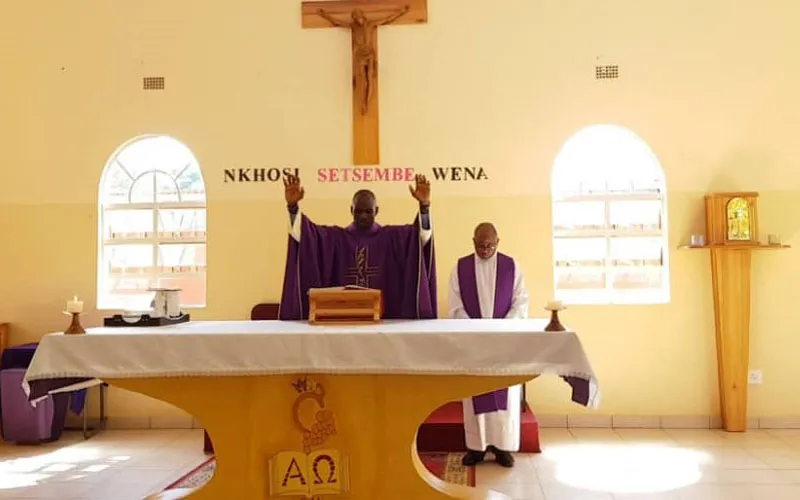
“The family unit we have here in Swaziland is different from what we have back home in Kenya and in many other Africa countries. Here, it is common to find members of the same family belonging to different denominations. It therefore becomes difficult to come together as a family for prayers,” the native of Kenya’s Kisumu Archdiocese says.
Other spiritual gaps that Fr. Francis finds difficult to fill include spiritual counselling, visiting the sick and Confessions for those who need the Sacrament of Reconciliation.
He says that the COVID-19 situation is especially difficult for people whose only satisfaction in life is going to church every day.
“There are people who would just go to church and get satisfied from just kneeling at the pews and looking at the Crucified Jesus without saying a word. These people are hurting the most and this is a gap we can’t fill for them,” Fr. Francis says.
Nevertheless, the religious missionary cleric adds, “as the wise men say, half a loaf is better than no loaf at all. We live in hope and trust that this situation will soon go away and the people of God will get back to occupy their benches where for now only their names are pinned.”
Agnes Aineah is a Kenyan journalist with a background in digital and newspaper reporting. She holds a Master of Arts in Digital Journalism from the Aga Khan University, Graduate School of Media and Communications and a Bachelor's Degree in Linguistics, Media and Communications from Kenya's Moi University. Agnes currently serves as a journalist for ACI Africa.



